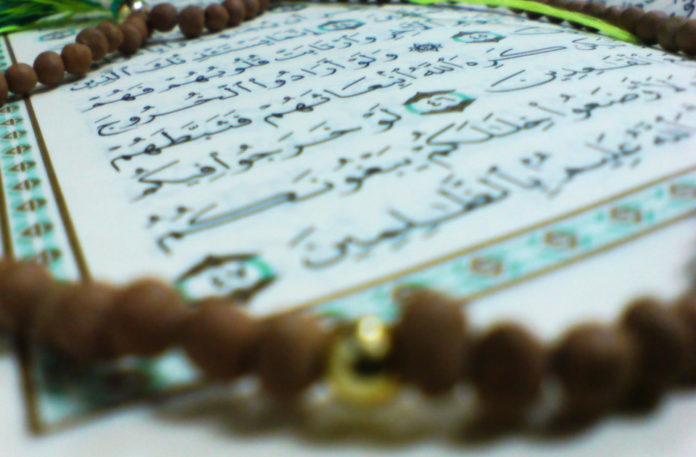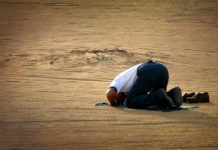Muslim in his Saheeh in Volume 1, writes that during the time of the Prophet (PBUH) Umar bin Khattaab beat Abu Hurayrah for fabricating lies.
In Volume 2 of Saheeh Muslim, he quotes ‘Aa’ishah ra, “Abu Hurayrah is a great liar who fabricates ahaadeeth and attributes them to the holy Prophet.”
In Volume 4 of Saheeh Muslim, Nadwee says “Imaam Abu Haneefah said, ‘The Companions of the Prophet ﷺ were generally pious and just. I accept every haeeth narrated by them, but I do not accept the ahadeeth whose source is Abu Hurayrah, Anas ibn Maalik, or Samrah ibn Jundab.'”
I have the following comments:
(1) It is obvious from the initial post that the information quoted is a poor rephrasing of some well known incidents surrounding Abu Hurayrah’s life – radiyallahu ‘anhu – which have been addressed by the scholars. These events are often used to discount Abu Hurayrah’s veracity and thereby negate a large section of the Sunnah.
The two prominent sources in contemporary times for raising these allegations against Abu Hurayrah are the Shee’ah and the students of the orientalists.
As for the former, many of these allegations are to be found in the work, Abu Hurayrah, by the Lebanese Shee’ee author, Abd al-Husayn Sharaf ul-Deen al-‘Amalee.
Aspects of this work were refuted by Dr. Muhammad Ajaaj al-Khateeb (Professor at the University of Damscus, Colleges of Sharia and Education) in his Master’s thesis, al-Sunna Qabl al-Tadween (Cairo: 1483/1963) and also in his work, Abu Hurayrah Raawiya al-Islaam (Cairo: 1962).
Regarding the latter, most of the arguments of the Orientalists were summarized by Mahmud Abu Rayyah of Egypt. In his work, Adwa’ ‘alas-Sunnat-il-Muhammadeeyah (Cairo: 1377/1958), Abu Rayya attempted to show that the Sunnah is fabricated in the whole and toward that aim he raised questions on Abu Hurayrah’s veracity.
When Abu Raya’s book first appeared, a number of scholars addressed his arguments. The most prominent responses were
Dr. Mustafaa as-Sibaa’ee (founder of the Muslim Brotherhood in Syria), in his thesis, al-Sunna wa Makanatuha fit-Tashree’ al-Islaamee, (Cairo: 1380/1961);
Shaykh ‘Abdur-Razzaq Hamza (the head of Darul-Hadeeth in Makkah and Imaam of Masjid al-Haram), Zulumat Abi Raya amam Adwa’ al-Sunnah al-Muhammadeeyah, (Cairo: n.d.); and
The definitive response by Shaykh ‘Abdur-Rahmaan ibn Yahyaa al-Mu’allamee al-Yamanee (the Librarian of Masjid al-Haram), al-Anwaar ul-Kaashifah lima fee Kitaab Adwaa’ ‘ala al-Sunnah min al-Zallal wa l-Tadleel wa l-Mujaazafah, (Cairo: 1378) – may Allah have mercy with them all.
(2) It should be noted that pertaining to most of the objections raised against Abu Hurayrah, there exists a definitive defense written by the Iraqi Muslim Brotherhood scholar, ‘Abdul-Mun’im Saalih al-‘Alee al-‘Izzee, entitled Dif’a ‘an Abee Hurayrah (Baghdad: 1393/1973). In this work, al-‘Izzi reviewed, page by page, over 110 classical works (most of which are in a number of volumes, extending thousands of pages) with the aim of collecting everything related to Abu Hurayrah.
With regards to the three specific objections raised against Abu Hurayrah in the post, the response is as follows:
(3) ‘Umar never beated Abu Hurayrah during the lifetime of the Prophet – sallallahu ‘alaihi wa sallam – for lying against the Prophet.
However, both ‘Abdul-Husayn al-‘Amalee (p. 268) and Abu Rayya (pp. 163, 171) report that ‘Umar struck Abu Hurayrah with a shield for relating too many hadeeth upon the Prophet – sallallahu ‘alaihi wa sallam – and accused him of lying. The source of this incident is not Saheeh Muslim, but rather a Shee’ee text, Sharh Nahj al-Balagha, by the Shiite Mu’tazilite Ibn Abi al-Hadid who quotes Abu Ja’far al-Iskafi. Abu Ja’far al-Iskafi is a third century, Shiite Mu’tazalite. Al-Iskafi relates this incident with no chain or authorities (sanad). And thus this is an unverified historical incident that appears centuries after the deaths of ‘Umar and Abu Hurayrah. And moreover it is found in the works of those who harbor religious animosities against Abu Hurayrah and adverse theological positions toward the Sunna. (See: al-Mu’allamee, al-Anwaer al-Kaashifah, pp. 152-153, al-Khateeb, al-Sunnah Qabl al-Tadween, p. 457, al-‘Izzee, Difaa’ ‘an Abee Hurayrah, p. 123)
Historically, the Jahmee, Bishr al-Mareesee was perhaps the first to claim that ‘Umar said that “the greatest liar among the narrators of hadeeth is Abu Hurayrah.” To this fabrication, Imam al-Darimee responded, “How could ‘Umar accuse him of lying against the Messenger of Allah – sallallahu ‘alaihi wa sallam – and [at the same time] place his in charge of important posts. Had [Abu Hurayrah] been thought of by ‘Umar – radiyallahu ‘anhu – as [al-Mareesee] claimed, ‘Umar would not have entrusted [Abu Hurayrah] with the affairs of the Muslims, placing him in charge, time and time again.”
Also, ad-Darimee rhetorically asks al-Mareesee, “If you were truthful in your claim, then expose [to us] who narrated such. You will not be able to expose a trustworthy narrator.” (See al-Darimi, Radd al-Imaam al-Darimee ‘Uthmaan ibn Sa’eed ‘alaa Bishr al-Mareesee al-‘Aneed, pp. 132-135.)
Interestingly, al-‘Izzee shows that a number of grandsons of ‘Umar related hadeeth from Abu Hurayrah from the Prophet – sallallahu ‘alaihi wa sallam. Among whom: (a) Salim ibn ‘Abd Allah ibn ‘Umar, who in Saheeh al-Bukhari alone relates three hadeeth; (b) and Hafs ibn ‘Asim ibn ‘Umar, who in Saheeh al-Bukhari alone relates eleven hadeeth. al-‘Izzi comments (p. 123), “Did they not hear from their fathers that their grandfather considered Abu Hurayrah a liar?”
(4) ‘Aa’ishah – radiyallahu ‘anha- never accused Abu Hurayrah of lying. However, there do exist a number of incidents where she corrected Abu Hurayrah for erring in the hadeeth he transmitted. This was not unique for Abu Hurayrah, but rather ‘Aa’ishah corrected a number of the Companions. Imaam al-Zarkashee (794 A.H.) has gathered and commented upon all the statements wherein which ‘Aa’ishah corrected another of the Prophet’s companions in his al-Ijaba li Irad ma Istadraakahu ‘Aa’ishah ‘ala -Sahaabah.
Of these criticisms by ‘Aa’ishah, there exists one in Saheeh Muslim (Cairo: Vol. 3, p. 137). Specifically that Abu Hurayrah related that the individual who at dawn (fajr) is in a state of sexual defilement, he is not permitted fast. When ‘Aa’ishah and Umm Salamah were questioned regarding this they informed that the Prophet – sallallahu ‘alayhi wa sallam – during the month of Ramadan would awake at dawn in a state of sexual defilement not due to a dream (i.e., due to having sexual relations) and fast. When Abu Hurayrah was later questioned as to his source, he informed that he heard that from al-Fadl ibn ‘Abbas and not the Prophet – sallallahu ‘alayhi wa sallam – directly.
Az-Zarkashee (Cairo: p. 57) informs that the ruling delivered by Abu Hurayrah was initially the ruling given by the Prophet -sallallahu ‘alayhi wa sallam – but was later abrogated. This abrogation it seems did not reach Abu Hurayrah. That the ruling was abrogated is echoed in the verses regarding the permissibilty of sexual relations with one’s women during the night of Ramadan.
Moreover, it should be noted that a number of the leading scholars among the second generation (taabi’een), held the same opinion of Abu Hurayrah. Among them was ‘Aa’ishah’s nephew, ‘Urwah ibn al-Zubayr. It seems that ‘Urwah interpreted ‘Aa’ishah’s statement to indicate a ruling specific to the Prophet -sallallahu ‘alaihi wa sallam – and not general for the umma. This opinion was also held by Taawoos, ‘Ataa’, Saalim ibn ‘Abd Allah ibn ‘Umar, al-Hasan al-Basree, and Ibraaheem al-Nakha’ee. And thus we see this opinion among the scholars of the tabi’in in the cities of Makkah, al-Madeenah, al-Basra, and al-Koofah.
Moreover, there are incidents which show that ‘Aa’ishah did not consider Abu Hurayrah to be a liar even if she corrected him at times. Among which is that ‘Aa’ishah confirmed a hadeeth related by Abu Hurayrah regarding the reward for following a funeral bier which was questioned by Ibn ‘Umar. This is reported by al-Bukhari and Muslim. (See al-‘Izzee, pp. 234-235)
Al-‘Izzee (p. 110) also shows that when ‘Aa’ishah and Hafsah died Abu Hurayrah led the funeral prayers and Ibn ‘Umar was among the attendees. This is reported by al-Bukharee in his Taareekh as-Saghaar, p. 52. Al-Haakim reports in al-Mustadrak (Vol. 4, p. 6), that Ibn ‘Umar was among the people and had no objections.
Al-‘Izzee remarks, “We know that the Muslims choose the best among them to lead funeral prayers, how much more so when it is the wife of their Prophet – sallallahu ‘alaihi wa sallam – in this world and the next?”
One may surmize that had ‘Umar considered Abu Hurayrah to be a liar and beat him for that, how would Ibn ‘Umar allow (indeed, have no objections) Abu Hurayrah to lead the funeral prayer for his sister and Prophet’s wife, Hafsaa? If ‘Aa’ishah considered Abu Hurayrah to be a liar, would the Muslims permit Abu Hurayrah to lead the funeral prayers over her?
(5) As for Abu Haneefah’s rejecting the narrations of these three companions.
However, what does exists is a principle of Usool al-Fiqh among the Hanafee scholars that those narrations of Abu Hurayrah which are in agreement with analogy (al-qiyaas) areadopted, and what is in disagreement with analogy, one sees if the hadeeth has been accepted by the ummah, only then it is adopted; otherwise analogy is adopted in preference to hadeeth. (See Usool al-Sarkhasee, Vol. 1, p. 341)
The source of this principle is the Kufan scholar of the tabi’een, Ibraaheem an-Nakha’ee, who would not adopt all the hadeeth of Abu Hurayrah. Al-Dhahabi in his Mizaan al-I’tidaal (Vol. 1, p. 35) reports that an-Nakha’ee explained his motivations by arguing that Abu Hurayrah was not a scholar of fiqh (faqeeh).
In response, it should be noted: (a.) a number of scholars have objected to al-Nakha’i’s position. Among whom ath-Thahabi, Ibn Katheer and Ibn ‘Asaakir. (See ath-thahabi, Siyaar A’laam al-Nubalaa’, Vol. 2, p. 438 and Ibn Katheer, al-Bidaayah wan-Nihaayah, Vol. 8, pp. 109-110); (b.) Ibn ‘Abbas who is recognized as a faqeeh, once in a gathering says to Abu Hurayrah, “Give a fatwa O Abu Hurayrah;” (c.) For 23 years, after the death of ‘Uthmaan – radiyallahu ‘anhu – Abu Hurayrah would deliever fatawa in al-Madeenah. (See Tabaqaat Ibn Sa’d, Vol. 2, p. 372). There are no objections by anyone to Abu Hurayrah’s knowledge of fiqh. Moreover, most of Abu Hurayrah’s students among the tabi’in where accomplished scholars and judges. (d.) In comparing, the instances where an-Nakha’ee did not adopt the narration of Abu Hurayrah, we find that Abu Hurayrah’s narration is stronger than the opinion forwarded by an-Nakha’ee. (see al-‘Izzee, pp. 237-248)
I hope this response will be satisfying. Again al-‘Izzee’s defense is the definitive work and it is in 500 pages.
One final note, al-‘Izzi also goes under the pen name Ahmad al-Rashid. You might remember a couple of years ago he was arrested in the UAE (his place of residence) after returning from the MAYA conference. Just recently, he was released.
(NOTE: If you want to build a strong and powerful relationship with Allah, check out Islamia TV, where you can watch Islamic speakers from across the globe deliver inspiring and motivational courses. Learn more at www.islamia.tv.)






















